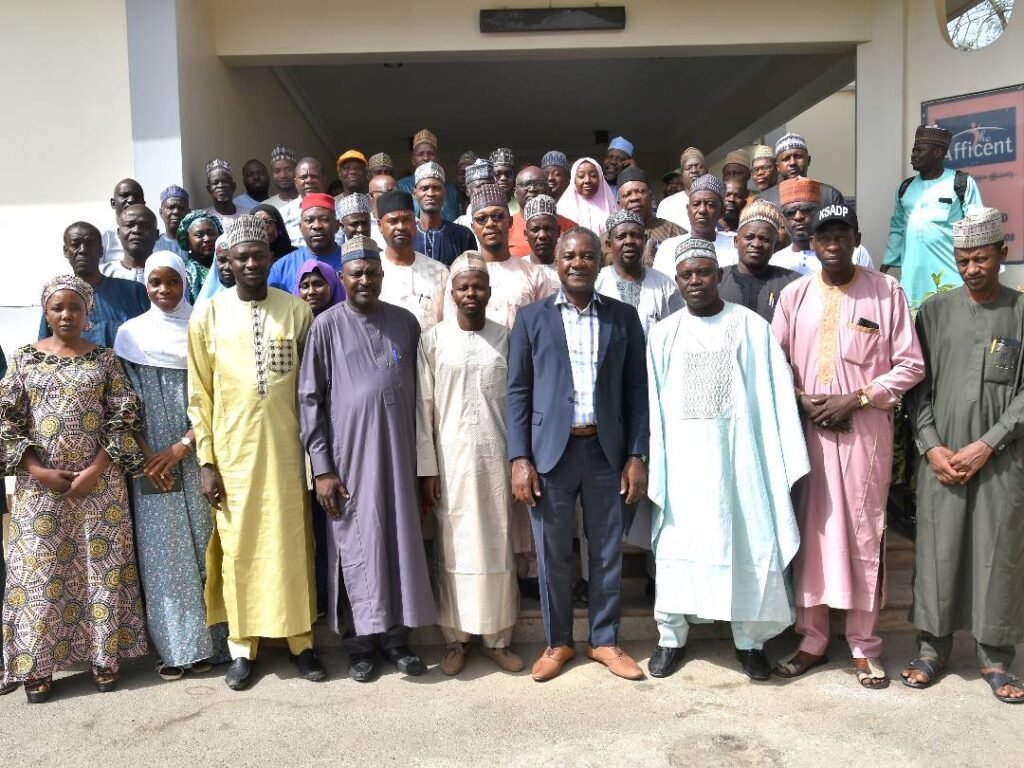THE Federal Government through the Federal Ministry of Agriculture and Rural Development (FMARD), Kano state government, through the commissioner of Agriculture from Kano State, Dr Jibrin Yusuf Rurum, stakeholders and many beneficiaries have commended Sasakawa Africa Association (SAA) for their role in transforming agriculture in Nigeria.
The commendation was stated in a communique at the end of a two-day 2023 Annual Stakeholders Review Meeting with the theme: ‘building resilience in food systems in the face of rising food demand and climate change, organised by the Nigeria Country Office of SAA from 7th-8th February, in Kano.
The Communique reads in full:
Communique issued at the end of the 2023 annual stakeholders review meeting organised by the Nigeria Country Office of Sasakawa Africa Association (SAA)
Date 7th – 8th February 2023 at
Venue: The Afficent Event Center, Kano.
The 2023 annual stakeholders review meeting organised by the Country Office of Sasakawa Africa Association was held from 7th- 8th February, 2023 at The Afficent event Center, 42 Sultan Road, Nasarawa GRA, Kano.
The meeting with the theme: Building Resilience in food Systems in the Face of Rising Food Demand and Climate Change attracted policymakers including the commissioner of Agriculture from Kano State. Participants from the Federal Ministry of Agriculture and Rural Development (FMARD), National Agricultural Research Institutes (NARIs), Agricultural Development Programmes (ADPs) of Nasarawa, Kano, Jigawa, Gombe, Niger, Kaduna etc, Universities, Private sectors, Farmers/Farmer organizations and Non-Governmental Organizations (NGOs).
The Country Director of SAA, Dr Godwin Atser welcomed participants and gave the rationale of the meeting while Special Remarks were received from SAA president, Dr Makoto Kitanaka. The Vice Chancellor Aliko Dangote University of Science and Technology, Wudil, Prof Musa Tukur Yakasai delivered a paper titled: Building Resilience in food systems in the face of rising food demand and climate change.
Goodwill messages were received from International Institute of Tropical Agriculture (IITA), International Crops Research Institute for the Semi-Arid Tropics (ICRISAT), National Agricultural Extension And Research Liaison Services (NAERLS), Nigerian Stored Products Research Institute (NSPRI), Federal Ministry of Agriculture and Rural Development (FMARD), seed companies, Honda, Agricultural Development Programs (ADPs), etc
Sasakawa Africa Association 2022 achievements were presented not only based on the three (3) main pillars of Regenerative Agriculture (RA), Nutrition Sensitive Agriculture (NSA), Market Oriented Agriculture (MOA), but also the crosscutting components—capacity development, inclusion, and digitization. There was a panel session comprising farmers and technical staff as well as technical paper presentations.
Technical papers presented include Regenerative agriculture: SAA Perspective; Strengthening the Pathways Linking Agricultural Extension Delivery to Improved Food and Nutrition Security; Taking Cassava Seed System to Scale—The Case of BASICS-II; Digital System as Tool for Effective Extension Delivery; and Integrated Approach to Climate Change in Rice Production in Nigeria.
Rising from the two-day deliberations, participants at the meeting made the following recommendations/resolutions:
1) The role of SAA in strengthening the extension system in Nigeria was appreciated and commended. Specifically, SAA beneficiaries testified to the fact that they were trained on improved agricultural technologies, including demonstrations, collective action, enterprise development and management, linkages to value chain actors and empowerment with enterprise development kits. In addition, effort to tackle malnutrition through the dissemination of bio- fortified crops, crop diversity as well as processing was commended.
2) The refreshed strategy of SAA across three pillars: RA, NSA and MOA plus the crosscutting components: capacity building, inclusion and digitisation was discussed. The strategy was welcomed by participants as a positive move to respond to the emerging challenges facing agricultural development.
3) Results from Sasakawa fields showed that using RA practices farmers doubled their yields, at the same time farmers’ profitability increased. These efforts were commended and participants requested that the SAA model should be scaled to new geographies.
4) Recognising the impact of climate change on agriculture, and particularly smallholder farmers who make up 60 percent of the food value chain, stakeholders agreed that there was a need for joint efforts to tackle the negative impact of climate change.
5) There was the need to engage the universities in the areas of documentation of research impact in the field
6) Participants reiterated the need not to underestimate the impact of existing extension networks. Therefore, projects and programs should engage the ADPs for the seamless implementation of interventions.
7) The efforts of Kano State Government through the Kano State Agro-pastoral Development Project (KSADP) that is being implemented in partnership with SAA towards transforming agriculture in the state were commended. In particular, the resuscitation of the extension system in the state
8) The issue of extension policy for the country was discussed, and participants called on the Federal Government to sign the extension policy document to strengthen the extension system in Nigeria.
9) The role of digital extension was extensively discussed. It was agreed that digitalization of extension services must be done in the context of the realities of farming/farmers’ typologies. Therefore, the design of digital tools should be human-centered. Furthermore, there is a need to raise awareness of existing digital tools to promote adoption and use.
10) The Building an Economically Sustainable Integrated Cassava Seed System (BASICS) model of scaling cassava seeds was appreciated. Participants requested BASICS-II project and National Agriculture Seed Council (NASC) should scale cassava seeds system to the northern part of Nigeria considering that cassava in the region has transformed from a subsistence crop to a cash crop.
11) Recognizing that no one institution can tackle the myriad of problems confronting agriculture, it was agreed that there is need for partners to break silos and work collaboratively
12) The new focus of the SAFE program targeting short courses was extensively discussed and welcomed by participating universities. However, it was agreed that delegates from universities go back and discuss with their management on the feasibility of opening and operating short certificate courses effectively.
13) Participants expressed serious concerned over the extension farmer ratio (1:10,000) and urged governments to fully resuscitate the state ADPs towards higher functionality. In addition, the use of pluralistic extension model involving private-advisory service providers was welcomed.
–







